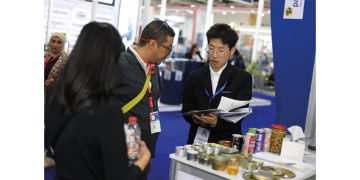With its young and growing population, food and beverage consumption and production are both in creasing in Turkey.
Due to the climatic and ecological conditions that are naturally granted, Turkey has the means to dominate world trade in many traditional agricultural products.
Together with hazelnuts, sultanas, dried apricots and dried figs which are traditional agricultural export products, Turkey dominates the world markets both in terms of production and exports. Cereals, pulses, cut flowers and fisheries are also of significant importance for Turkish agricultural export. Also, Turkey’s vast agricultural potential, offers an extensive range of fruits such as grapes, figs, olives, apricots, sour cherries and strawberries and vegetables such as potatoes, tomatoes, leeks, peppers and onions which can be preserved by different methods and apresented in a variety of ways.
The Turkish food industry has important export opportunities due to the diverse agricultural products available in the country. Being a developing country, the GDP per capita is expected to in crease in coming years, which will also have the effect of in creasing consumer spending.
Turkey’s food industry has registered a steady growth in recent years, with the Turkish consumers becoming increasingly demanding, driven by the multitude of choices offered by mass grocery retail outlets. Rising disposable income and changing consumption patterns, along with the increase in the number of females in full-time employment, have all led to an increase in interest as regards packaged and processed food, such as ready-to-eat meals and frozen food.
As the sector is getting more sophisticated, Turkey is becoming one of the largest markets for baked goods with its bread – an important element of the Turkish diet – leading to some of the highest rates of per capita consumption in the world. On the other hand, subsector dairy products including milk, yoghurt, cheese, kefir and ayran (a drink made of yoghurt and water) form an integral part of the traditional Turkish diet. Traditionally, artesian, unpackaged products have dominated the Turkish dairy market, holding back widespread growth but also posing a potential to the investors.
The food, beverage and tobacco industry also has the highest share in household consumption in Turkey, with 27 percent in 2010. The strengths of the industry include the size of the market in relation to the country’s young population, a dynamic private sector economy, substantial tourism income and a favorable climate.
The food and beverage industry contributes to Turkey’s exports as well, achieving USD 6.7 billion –accounting for around 6 percent of the total exports in 2010.
Turkey’s food, beverage and tobacco industry has been one of the mostattractive areas for foreign investors. It has attracted tremendous amount of foreign direct investment (FDI), attracting around USD 4 billion over the past ten years, as it offers lucrative investment opportunities to global investors. The geographical location of Turkey presents the country a very advantageous situation in international trade. Turkey’s proximity to Europe, the Middle East and North Africa, Central Asia provides an easy access to large markets through the Black Sea to the North, the Aegean Sea to the West and the Mediterranean Sea to the south.
Processed Fruits and Vegetables Dried fruits and edible nuts, tomato paste and other tomato products, canned fruits and vegetables, frozen fruits and vegetables, dehydrated vegetables and fruit juice are regarded as the most important sectors under this heading. These sectors include items making up the majority of Turkey’s total export revenues both from agriculture and agroindustry.
The products of the dried fruits and edible nuts sector, which are very important for the Turkish economy, are hazelnuts, raisins, dried figs and dried apricots. These products are regarded as traditional agricultural export products of Turkey. Especially, hazelnut, raisins, dried figs and dried apricots have been the products representing Turkish production and quality for years. With them Turkey dominates the world markets: Turkey is the number one producer and exporter of hazelnuts, dried apricots and figs in the world. Hazelnuts, rich in unsaturated fats, apricots rich in vitamin A and many minerals and raisins having blood-making property are supplied to health conscious consumers around the world.














